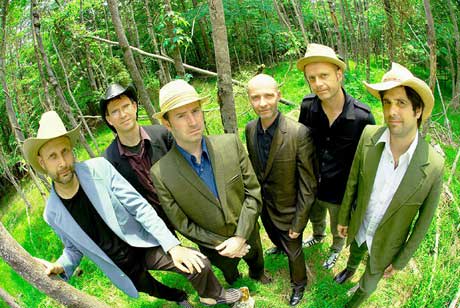Following the revelatory compilation The Roots Of Chicha last year comes a new band led by compiler Olivier Conan dedicated to reviving the Peruvian psychedelic cumbia sound of the 60s and 70s. Conan, the proprietor of Brooklyns Barbes bar and music label, has dialled the energy back with Chicha Libre but pumped up the psych. The more restrained but spacious grooves are immediately apparent on the opening title track. Compared with the original version by Los Mirlos from Roots, it seems lounge-y. Slowly the subtle and effective dub mixing changes the placement of all the elements of the mix. One hardly notices the relatively aggressive solos within the dreamlike momentum. There is a French element in the mix as well. Two tracks are sung in Conans native language, covers of Satie and Ravel actually work out well and a reconfigured "Popcorn by Perrey and Kingsley survives the trans-Atlantic, trans-Andean journey quite nicely. Chicha Libre could be classified as exotica but consider that the original brand of chicha was entirely comprised of music that wasnt native to Peru but to Cuba, the United States and Brazil, among others. Conan and company are putting their own twist on this pre-mixed cocktail.
How did you come to assemble the Roots of Chicha?
Olivier Conan: I was in Peru travelling around with my girlfriend, not really doing an ethno musicological trip, per se. I was buying a lot of bootleg CDs from street vendors. One of them told me about early chicha stuff and played me a lot of records. I loved it. It had a lot of elements of music Ive been into all my life.
How did you adapt the music to the personnel you had at hand?
The band started more like, "hey, I brought back some really cool records from Peru; we should try to play them. It came about in a very organic way. Its not very difficult music to play and once you play a lot of those tunes, you understand how they work. One of the things I really liked about chicha in general is that it was borrowed music. All the musical codes that these people used are borrowed from other cultures, which is what I do too. So, it was interesting to borrow a borrowed culture to begin with. [Its not cultural appropriation] in a cynical way, they just want to make people dance.
(Barbes)How did you come to assemble the Roots of Chicha?
Olivier Conan: I was in Peru travelling around with my girlfriend, not really doing an ethno musicological trip, per se. I was buying a lot of bootleg CDs from street vendors. One of them told me about early chicha stuff and played me a lot of records. I loved it. It had a lot of elements of music Ive been into all my life.
How did you adapt the music to the personnel you had at hand?
The band started more like, "hey, I brought back some really cool records from Peru; we should try to play them. It came about in a very organic way. Its not very difficult music to play and once you play a lot of those tunes, you understand how they work. One of the things I really liked about chicha in general is that it was borrowed music. All the musical codes that these people used are borrowed from other cultures, which is what I do too. So, it was interesting to borrow a borrowed culture to begin with. [Its not cultural appropriation] in a cynical way, they just want to make people dance.




